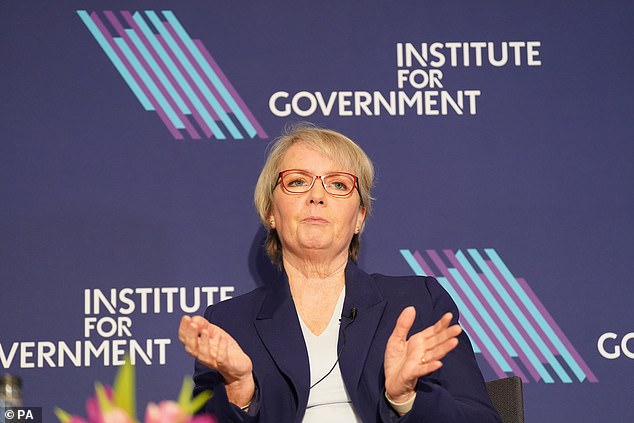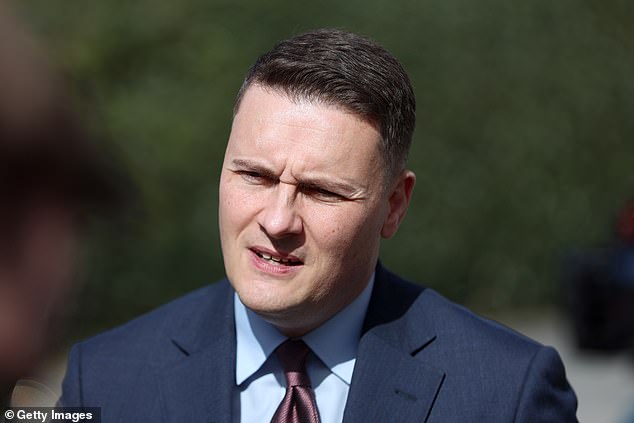GPs will receive a £20 ‘bonus’ each time they avoid referring a patient directly to hospital under a scheme aimed at cutting NHS waiting lists.
Ministers say the cash incentives – totalling up to £80million – will ‘stop masses of people’ being sent to hospital for ‘unnecessary appointments’.
But patient groups warn attempts to ‘massage waiting lists’ could be dangerous, with some missing out on the care they need.
Practices will be paid the sum if GPs consult a specialist on the phone or online before making a referral, in a process known as ‘Advice and Guidance’.
They will indicate if the patient should be referred to a hospital consultant or if there are alternative options that could be explored first.
It may mean patients are simply prescribed medication, sent for preliminary scans or blood tests or directed to a community service, such as a physiotherapist.
Around 660,000 treatments were ‘diverted’ from hospital and into the community through the scheme between July and December 2024 but take-up was ‘patchy’ across the country.
Now the Department of Health and Social Care hopes the new payments will increase ‘diversions from the elective waiting list’ to 2million by the end of 2025/26.

Health minister Karin Smyth (pictured) said the payments will ‘stop masses of people’ being sent to hospital for ‘unnecessary appointments’
It estimates half of the requests to the A&G hotlines will result in a referral to hospital, with the remainder advised to go elsewhere.
GP practices will be paid for using the service, regardless of the outcome. Decisions on routine matters are typically returned within a week.
Health minister Karin Smyth said: ‘By caring for patients closer to home, we save time and stop masses of people having to head to hospital for unnecessary appointments in the first place.
‘We are rewiring the NHS so that we are doing things differently, more efficiently and delivering better outcomes for patients.
‘This scheme is a perfect example of how we are saving patients time and reducing pressure on key NHS services in the process.’
There are currently 6.24million people on NHS waiting lists in England, waiting for 7.4million treatments. Some have been waiting over 18 months.
Health secretary Wes Streeting has vowed to ensure 92 per cent of patients will be waiting less than 18 weeks by the end of this Parliament.
Beccy Baird, senior fellow at The King’s Fund, a health think tank, said: ‘Effective implementation will be key to the scheme’s success, and commissioners must safeguard against potential unintended consequences.

Patient groups warn attempts to ‘massage waiting lists’ could be dangerous, with some missing out on the care they need
‘Financial incentives for GPs based on the number of requests raised could undermine the primary goal of delivering high-quality care and the scheme must avoid introducing unnecessary steps into a patient’s journey.’
Dennis Reed, director of Silver Voices, which campaigns for elderly patients, said the initiative could be an attempt to ‘massage waiting lists’.
He added: ‘I’m sceptical there are sufficient resources to cope with such transformational change.
‘Patients already struggle to see an NHS dietician, physiotherapist or podiatrist in the community because there is so much demand.
‘Previous initiatives aimed at moving mental health care into the community led to some vulnerable patients falling through the cracks and others receiving sub-standard treatment.
‘I would be concerned if that happened again.’
The Department of Health and Social Care said the change could benefit women with menopausal symptoms, patients with irritable bowel syndrome and those with ear, nose and throat issues.
Ruth Rankine, director of primary care at the NHS Confederation, which represents health organisations, said: ‘Advice and Guidance, if implemented effectively, can support improved patient care, streamlined referrals processes, and efficient use of resources.

Health secretary Wes Streeting (pictured) has vowed to ensure 92 per cent of patients will be waiting less than 18 weeks by the end of this Parliament
‘For many conditions, we know that hospital treatment isn’t the best option.’
The British Medical Association, the doctors’ union, has previously called on GPs to boycott the A&G service as part of industrial action as it did not attract a fee.
One senior member even described the policy as ‘just another Berlin Wall’ being put up to prevent GPs referring.
But Dr Katie Bramall-Stainer, chair of the BMA’s GP committee for England, said: ‘This scheme was recently negotiated between the BMA and the Government and starts us on a path of funding what was previously undertaken by GPs and their team for no additional resources.
‘We have seen decades of underinvestment in general practice, and this is an important small step in acknowledging the important role of the GP and supporting practices to deliver enhanced care to patients in the community.’






